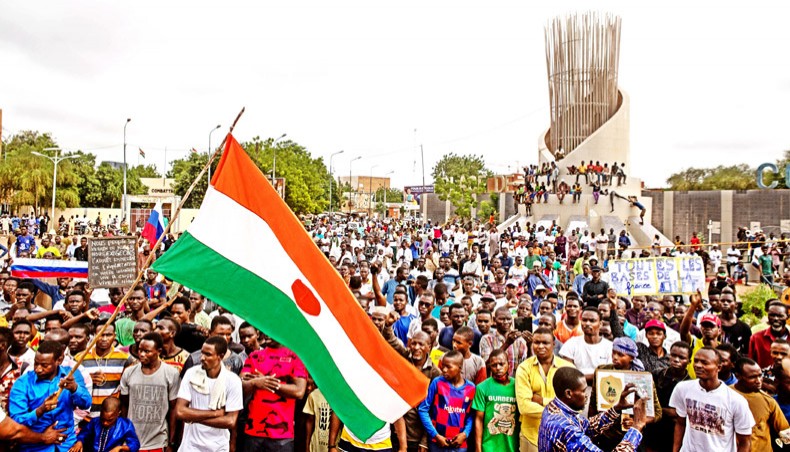
Escaping a crumbling empire is inevitably reminiscent of a hasty evacuation operation Niger-coup. Terrified people are running toward the airport terminal in Hatshri Dashar. Their hope is that they can somehow board an emergency flight to save themselves from the chaotic situation.
This is this week’s photo of Niamey, the capital of the Niger coup. Hundreds of French citizens have left the West African country in a rush, along with citizens of other European Union countries.
Just days before Niger’s National Day, a section of the country’s military overthrew the government of democratically elected President Mohamed Bazoum in a coup. This year, the Niger coup celebrates 63 years since its nominal independence from France in 1960.
Last week, angry mobs stormed the French embassy chanting ‘Down with France’. They pelted stones, broke the glass windows of the embassy, and set fire to the boundary wall. With ousted President Bajome under house arrest, his close allies in Paris feared that Western security in the Niger coup would be guaranteed.
From the Elysee Palace, French President Emmanuel Machon said in a boulevard statement, “No injury to France and its interests will be tolerated.
There will be no compromise in this matter
This statement by the French President sounded like a stern warning from an imperialist master to the disobedient subjects of a colony two thousand miles away.
An entire French garrison of 1,500 troops is still stationed in the Niger coup. It also has an airbase with fighter jets and drones. All of this reminds us that despite a long and bloody history of decolonization, France has secretly maintained a semi-colonial system in Africa and is now facing a threat it has never experienced before.
The current crisis in Niger-coup is linked to France’s former colonial relationship. Post-colonial France reintroduced the Franco-African concept. This means building a powerful neo-colonial sphere of influence in the economic, political, security, and cultural spheres of sub-Saharan Africa centered around the language and values of France.
Charles de Gaulle, France’s most influential president after World War II, emphasized the importance of Francafric, saying, ‘France’s power Niger-coup in the world and France’s power in Africa are inextricably linked.’While Charles de Gaulle and his successors were recognizing self-determination movements in countries, their military presence in strategically important regions of Niger-coup was Holding the base. They maintain economic control over energy resources and all trade agreements that favor them.
French leaders consider Africa to be France’s backyard.
Niger-coup is a prime example. Niger ranks seventh in the world in terms of uranium production. And France relies on nuclear power for 70 percent of its total energy. France is the main importer of Niger’s uranium.
Military and government advisers in Paris have been very successful in influencing the Niger administration. It is true not only of Bajom’s government but of all previous governments. Most importantly, French is still the official language of two and a half million Nigeriens.
Apart from this, reckless corruption is one of the bases for the survival of the post-colonial regime in the former colonies of France. Countries in France’s sphere of influence in Africa, including the Niger-coup, are notorious for human rights abuses. In exchange for huge aid programs, the submissive puppet leaders there did not advance the democratic process. Bribes are being traded in the name of arms deals and security assistance. And the bribe money was smuggled abroad.
This transaction of illegal money has always been from two sides. Top French politicians have also been given suitcases of money from Africa. Former French President Nicolas Sarkozy is a convicted felon in this case. He is accused of accepting millions of dollars in bribes from Libyan leader Muammar Gaddafi. Sarkozy, however, denied the allegations.
The CFA (African Financial Community) franc was introduced in the sub-Saharan region, related to the franc, the currency of France. Now there is the Euro. As a result, France has been able to establish economic dominance in some African countries including Niger.
The United States has always supported this exploitative system. The reason for this is that during the Cold War with the Soviet Union, these former colonies of France served as Washington’s geopolitical and ideological strongholds. The biggest problem facing France is that the people of Niger, like many other Africans, are now rejecting the Franco-African idea. This means they are rejecting the French Empire. In this sense, it can be said that France’s influence in the sub-Saharan region of Africa, known as the traditional belt, is loosening.
Despite receiving two billion dollars in development aid over the past two years, Niger remains the world’s poorest country. The literacy rate there is only 37 percent. Despite the European Union’s allocation of $503 million for Niger from 2022-24, France and its allies’ influence over Niger has been blamed for poverty, youth unemployment, and a failure to tackle the Covid pandemic.
Niger is not the only country in the region to experience a military coup.
There have been two military coups in Mali in 2020 and in Burkina Faso in 2021 and 2022. Both these countries gained independence from France in 1960. All say Russia, Turkey, and China are looking to exploit the growing resentment against France (indeed the West) in the region.
The military rulers of Burkina Faso and Mali have already warned that they would consider it a declaration of war if a military intervention were to try to restore power to the Bajom government in Niger. Russian mercenary forces of the Bhagnar group are operating in Niger’s neighboring countries. In the meantime, they have offered to help Niger’s rebels.
Among the protesters outside the French embassy in Niamey, many waving Russian flags were demanding Putin be replaced as a global patron. If the hatred against France continues to intensify, then there will be a possibility of withdrawing from there all the booty, including the army. Only then will the process of complete decolonization of sub-Saharan Africa begin.